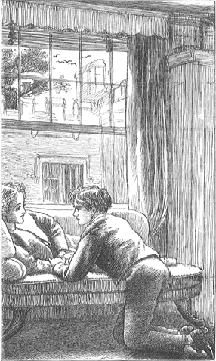any of those faults had been brought before me which sometimes occur amongst us; had I heard that any of you had been guilty of falsehood, or of drunkenness, or of any other such sin; had I heard from any quarter the language of profaneness, or of unkindness, or of indecency; had I heard or seen any signs of that wretched folly which courts the laugh of fools by affecting not to dread evil and not to care for good, then the unsuitableness of any of these things with the scene I had just quitted would indeed have been most intensely painful. And why? Not because such things would really have been worse than at any other time, but because at such a moment the eyes are opened really to know good and evil, because we then feel what it is so to live as that death becomes an infinite blessing, and what it is so to live also, that it were good for us if we had never been born.”
Tom had gone into chapel in sickening anxiety about Arthur, but he came out cheered and strengthened by those grand words, and walked up alone to their study. And when he sat down and looked round, and saw Arthur’s straw-hat and cricket-jacket hanging on their pegs, and marked all his little neat arrangements, not one of which had been disturbed, the tears indeed rolled down his cheeks; but they were calm and blessed tears, and he repeated to himself, “Yes, Geordie’s eyes are opened—he knows what it is so to live as that death becomes an infinite blessing. But do I? Oh, God, can I bear to lose him?”
The week passed mournfully away. No more boys sickened, but Arthur was reported worse each day, and his mother arrived early in the week. Tom made many appeals to be allowed to see him, and several times tried to get up to the sick-room; but the housekeeper was always in the way, and at last spoke to the Doctor, who kindly but peremptorily forbade him.
Thompson was buried on the Tuesday, and the burial service, so soothing and grand always, but beyond all words solemn when read over a boy’s grave to his companions, brought him much comfort, and many strange new thoughts and longings. He went back to his regular life, and played cricket and bathed as usual: it seemed to him that this was the right thing to do, and the new thoughts and longings became more brave and healthy for the effort. The crisis came on Saturday, the day week that Thompson had died; and during that long afternoon Tom sat in his study reading his Bible, and going every half-hour to the house-keeper’s room, expecting each time to hear that the gentle and brave little spirit had gone home. But God had work for Arthur to do: the crisis passed—on Sunday evening he was declared out of danger; on Monday he sent a message to Tom that he was almost well, had changed his room, and was to be allowed to see him the next day.
It was evening when the housekeeper summoned him to the sick-room. Arthur was lying on the sofa by the open window, through which the rays of the western sun stole gently, lighting up his white face and golden hair. Tom remembered a German picture of an angel which he knew; often had he thought how transparent and golden and spirit-like it was; and he shuddered to think how like it Arthur looked, and felt a shock as if his blood had all stopped short, as he realized how near the other world his friend must have been to look like that. Never till that moment had he felt how his little chum had twined himself round his heart-strings; and as he stole gently across the room and knelt down, and put his arm round Arthur’s head on the pillow, felt ashamed and half angry at his own red and brown face, and the bounding sense of health and power which filled every fibre of his body, and made every movement of mere living a joy to him. He needn’t have troubled himself; it was this very strength and power so different from his own which drew Arthur so to him.

Tom’s Visit to Arthur after the Fever
Arthur laid his thin white hand, on which the blue veins stood out so plainly, on Tom’s great brown fist, and smiled at him; and then looked out of the window again, as if he couldn’t bear to lose a moment of the sunset, into the tops of the great feathery elms, round which the rooks were circling and clanging, returning in flocks from their evening’s foraging parties. The elms rustled, the sparrows in the ivy just outside the window chirped and fluttered about, quarrelling, and making it up again; the rooks young and old talked in chorus, and the merry shouts of the boys and the sweet click of the cricket-bats came up cheerily from below.
| Previous chapter/page | Back | Home | Email this | Search | Discuss | Bookmark | Next chapter/page |